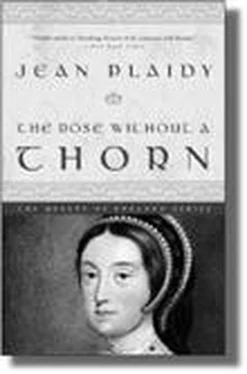He did so.
“There are no regrets, my love,” she said.
He stood up and stared disbelievingly down at her. He could not believe that the vital, beautiful Mary Tudor had left him forever.

BIBLIOGRAPHY
Aubrey, William Hickman Smith, The National and Domestic History of England
Batiffol, Louis (translated by Elsie Finnimore Buckley), National History of France
Chamberlin, Frederick, The Private Character of Henry the Eighth
Fisher, H.A.L., The Political History of England (1485–1587)
Froude, James Anthony, History of England
Gairdner, James (editor), Memorials of Henry VII
Green, Mary Anne Everett, Lives of the Princesses of England
———, Letters of Royal and Illustrious Ladies of Great Britain
Guizot, M. (translated by Robert Black), History of France
Hackett, Francis, Henry the Eighth
———, Francis the First
Herbert, Edward, Lord, History of England under Henry VIII
Hudson, Henry William, France
Jackson, Catherine Charlotte, Lady, The Court of France in the 16th Century
Salzman, L. F., England in Tudor Times
Stephens, Sir Leslie, and Sir Sidney Lee (editors), The Dictionary of National Biography
Strickland, Agnes, Lives of the Queens of England
Wade, John, British History

ABOUT THE AUTHOR
JEAN PLAIDY is the pen name of the late English author E. A. Hibbert, who also wrote under the names Philippa Carr and Victoria Holt. Born in London in 1906, Hibbert began writing in 1947 and eventually published over two hundred novels under her three pseudonyms. The Jean Plaidy books—ninety in all—are works of historical fiction about the famous and infamous women of English and European history, from medieval times to the Victorian era. Hibbert died in 1993.


Questions for Discussion
1  Mary and Henry maintain a subtle balance of power between them. Although Henry has the last word by virtue of being king, Mary has enormous emotional sway over him. Where do you see Mary affecting Henry’s decisions or intervening to calm situations that would otherwise prove disastrous? When does Henry first offer a glimpse of just how dangerous his temper can be, even with Mary?
Mary and Henry maintain a subtle balance of power between them. Although Henry has the last word by virtue of being king, Mary has enormous emotional sway over him. Where do you see Mary affecting Henry’s decisions or intervening to calm situations that would otherwise prove disastrous? When does Henry first offer a glimpse of just how dangerous his temper can be, even with Mary?
2  Henry is so eager to become king that he joyfully anticipates his own father’s death: “Every direction in which he turned he found adulation, and very soon—it could not be long because the old man was coughing and spitting blood regularly now—he would be the King of this country.” And as Mary contemplates her brother Arthur’s death, she muses, “perhaps it was all for the best … for Henry was surely meant to be King.” Are Henry and Mary vultures or pragmatists? Do you think their attitude is a necessary product of life in the English court, or are they particularly cold-hearted?
Henry is so eager to become king that he joyfully anticipates his own father’s death: “Every direction in which he turned he found adulation, and very soon—it could not be long because the old man was coughing and spitting blood regularly now—he would be the King of this country.” And as Mary contemplates her brother Arthur’s death, she muses, “perhaps it was all for the best … for Henry was surely meant to be King.” Are Henry and Mary vultures or pragmatists? Do you think their attitude is a necessary product of life in the English court, or are they particularly cold-hearted?
3  Mary’s arrival in France as wife to Louis is a hard blow to “the trinity” of François, Marguerite, and Louise. Yet, ironically, it is François who is chosen by the king to greet Mary when she first arrives. How does this first meeting go? Does François have a soft streak, or is he a consummate actor? Mary asks herself, “What was it he was attempting to offer? Commiseration? Consolation?” What is the answer?
Mary’s arrival in France as wife to Louis is a hard blow to “the trinity” of François, Marguerite, and Louise. Yet, ironically, it is François who is chosen by the king to greet Mary when she first arrives. How does this first meeting go? Does François have a soft streak, or is he a consummate actor? Mary asks herself, “What was it he was attempting to offer? Commiseration? Consolation?” What is the answer?
4  Early in his rule, Henry faces a series of setbacks. The death of a newborn son, a mutiny by English soldiers in France, and the treacherous teaming-up of Ferdinand of Spain and the Emperor Maximilian, all send Henry into his first serious slump. What changes do you notice in Henry from this point on? How do they affect his rule, and how do they impact Mary’s plans? How does his wife, Queen Katherine, accidentally add insult to injury?
Early in his rule, Henry faces a series of setbacks. The death of a newborn son, a mutiny by English soldiers in France, and the treacherous teaming-up of Ferdinand of Spain and the Emperor Maximilian, all send Henry into his first serious slump. What changes do you notice in Henry from this point on? How do they affect his rule, and how do they impact Mary’s plans? How does his wife, Queen Katherine, accidentally add insult to injury?
5  The friendship between Charles Brandon and Henry is a vehicle for the most intense dramatic tension in the novel. What method does Charles find most effective for stroking the king’s ego and keeping him happy? Charles recognizes “a certain primness in Henry’s character”; what does he mean by this?
The friendship between Charles Brandon and Henry is a vehicle for the most intense dramatic tension in the novel. What method does Charles find most effective for stroking the king’s ego and keeping him happy? Charles recognizes “a certain primness in Henry’s character”; what does he mean by this?
6  Why does Pope Alexander agree to dissolve Louis XII’s marriage to Queen Jeanne? What is in it for him?
Why does Pope Alexander agree to dissolve Louis XII’s marriage to Queen Jeanne? What is in it for him?
7  Despite Charles Brandon’s passionate love for Mary, he seems to be quite content to adapt into whichever romantic union happens to come along. He is betrothed and then un-betrothed to Anne Browne, married to Margaret Mortymer, married to Anne Browne, betrothed to Elizabeth Grey, and comes very close to becoming betrothed to Margaret of Savoy. He is enthused at the beginning of each relationship, seeing it as a new lease on life, but soon becomes apathetic. What do you make of Charles? Is he fickle or just searching for true love? What makes the relationship with Mary stick?
Despite Charles Brandon’s passionate love for Mary, he seems to be quite content to adapt into whichever romantic union happens to come along. He is betrothed and then un-betrothed to Anne Browne, married to Margaret Mortymer, married to Anne Browne, betrothed to Elizabeth Grey, and comes very close to becoming betrothed to Margaret of Savoy. He is enthused at the beginning of each relationship, seeing it as a new lease on life, but soon becomes apathetic. What do you make of Charles? Is he fickle or just searching for true love? What makes the relationship with Mary stick?
8  From his cushy position as political prisoner in Henry’s court, the Duc de Longueville writes to Louis in France, describing Mary in glowing terms and reporting Henry’s deep love for her. What is the significance of this letter? What mischief is Longueville attempting to stir up? Does he succeed? Why does he find Henry’s court “so interesting and amusing to watch”?
From his cushy position as political prisoner in Henry’s court, the Duc de Longueville writes to Louis in France, describing Mary in glowing terms and reporting Henry’s deep love for her. What is the significance of this letter? What mischief is Longueville attempting to stir up? Does he succeed? Why does he find Henry’s court “so interesting and amusing to watch”?
9  Louise is tormented by the idea of Mary getting pregnant with the King’s child. Since she knows that Mary is desperately unhappy in the marriage, why doesn’t she encourage Mary to take a lover, thus creating a possibility that Mary will be discovered and ousted from the French court? What does Louise fear might happen?
Louise is tormented by the idea of Mary getting pregnant with the King’s child. Since she knows that Mary is desperately unhappy in the marriage, why doesn’t she encourage Mary to take a lover, thus creating a possibility that Mary will be discovered and ousted from the French court? What does Louise fear might happen?
10  What do you make of King Louis? He can see both the wild flirtation that goes on between Mary and François and the blatant love that Mary harbors for Charles Brandon. And yet, while it would be in keeping with the times to have her arrested for treason, he quietly suffers Mary’s indifference. He goes so far as to muse, “My poor little one … it is time I was dead.” Is he naïve, kind, self-loathing? What events in his life have led him to this point?
What do you make of King Louis? He can see both the wild flirtation that goes on between Mary and François and the blatant love that Mary harbors for Charles Brandon. And yet, while it would be in keeping with the times to have her arrested for treason, he quietly suffers Mary’s indifference. He goes so far as to muse, “My poor little one … it is time I was dead.” Is he naïve, kind, self-loathing? What events in his life have led him to this point?
11  When Mary leaves France, she tells Marguerite that “she would always remember their friendship with pleasure,” despite the fact that Marguerite has spent most of Mary’s reign as queen trying to get rid of her. Is this Mary’s version of diplomacy? Has she recognized and sympathized with the trinity’s ambitions? Where else do you see Mary smoothing feathers, politically and personally?
When Mary leaves France, she tells Marguerite that “she would always remember their friendship with pleasure,” despite the fact that Marguerite has spent most of Mary’s reign as queen trying to get rid of her. Is this Mary’s version of diplomacy? Has she recognized and sympathized with the trinity’s ambitions? Where else do you see Mary smoothing feathers, politically and personally?
Читать дальше



 Mary and Henry maintain a subtle balance of power between them. Although Henry has the last word by virtue of being king, Mary has enormous emotional sway over him. Where do you see Mary affecting Henry’s decisions or intervening to calm situations that would otherwise prove disastrous? When does Henry first offer a glimpse of just how dangerous his temper can be, even with Mary?
Mary and Henry maintain a subtle balance of power between them. Although Henry has the last word by virtue of being king, Mary has enormous emotional sway over him. Where do you see Mary affecting Henry’s decisions or intervening to calm situations that would otherwise prove disastrous? When does Henry first offer a glimpse of just how dangerous his temper can be, even with Mary?










